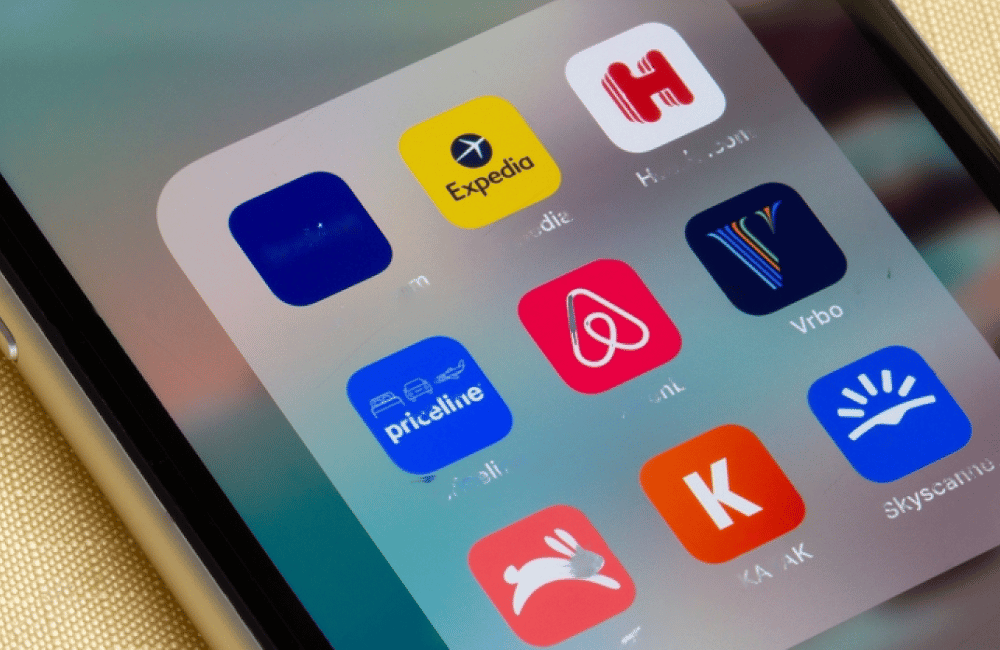In the digital era, technology has dramatically reshaped how we travel. From booking a flight to reserving a hotel room, or even planning an itinerary, there’s an app for everything. The market size of the online travel agency sector in 2020 reached a staggering $595.78 bn, a testament to the impact of technology on the travel industry. Companies such as Expedia, Airbnb, and Booking.com have revolutionized the online travel industry over the past few years.
Recent studies show that 66% of millennials book their trips using smartphones and a whopping 85% admit they consider online reviews before making final travel decisions. A Statista survey found that 40% of respondents downloaded a travel app because they couldn’t find the features they liked on mobile web platforms. The remaining 60% had diverse reasons to prefer a travel app over a travel site, including updates and offers via notifications, offline feature usability, preference storage for easier booking, and an overall better speed, look, and feel. If you own a travel company and are contemplating taking your business online, a travel app could complement your travel site excellently. In this post, we’ll delve into the different types of travel apps and the essential features your travel app should encompass.
Types of a Travel App
Travel apps generally follow one of three revenue models:
Merchant Model
Under this model, the company purchases or rents lodgings such as hotels, guest houses, rest houses, etc., at bulk rates, then resells them to guests. This model can also extend to airfare, car rentals, and other services. A prominent example of a company using this model is Expedia, which rents rooms in bulk and negotiates affordable deals for its customers from its hospitality partners.
Commission Fees Model
For smaller hotels lacking substantial advertising budgets, visibility is key. These hotels partner with large online travel companies to feature in their listings, and in return, these travel companies charge commission rates for every transaction. A well-known company operating under this model is the Dutch travel agency Booking.com, which charges between 10% and 30% for each booking made on their site.
Advertising Model
Ideal for small travel agents contemplating building a travel app, the advertising model is cost-effective and well-suited for travel agency owners on a limited budget. You can display relevant ads from tour operators, airlines, hotels, car rental services, and more. Consider TripAdvisor’s approach as an example: it runs ads for flights and hotels on the app and collects revenue through cost-per-click charges from OTA and suppliers. They earn by redirecting customers to third-party websites.
Features to Include in a Travel App
When developing a travel app, two kinds of features should be considered: Minimum Viability Product features or core features, and some advanced ones. Let’s explore these further:
Core Features
Registration and Profile Management: Allowing users to browse your app without logging in every time can significantly enhance user experience. However, for users wishing to book a hotel, flight, or save payment details, registration becomes mandatory. Most travel apps allow sign-up via email or phone number, and social login integration for user convenience is an added advantage.
Search and Filters: A user-friendly navigation with search and filter options is paramount. Users should be able to filter search results according to their preferences, such as location, budget, number of guests, and additional services.
Listing Information: Users should have access to comprehensive details like descriptions, customer ratings and reviews, refund and cancellation policies, etc. Mapping listings can also be helpful to determine the location of hotels and their distance from city centers or nearest transport hubs.
Messaging Channels: Ensuring a means of communication between the app and customers is crucial. Live chat options can also be provided to enable users to connect with travel agents or hotel representatives.
Push Notifications: These are a great way to engage users and drive bookings and revenue. You can keep users informed about new offers, prices, and discounts or remind them about abandoned services.
Advanced Features
Weather Forecasting: By integrating APIs like Forecast.io, OpenWeatherMap, YahooWeather, you can provide users with accurate weather forecasts, a critical factor in their travel plans.
Emergency Services: Offering detailed information about emergency services can be a lifesaver for travelers, especially in unfamiliar locations.
In-App Payment: Providing an in-app payment gateway can make the transaction process faster, reducing transaction abandonments.
Loyalty & Referral Programs: Encouraging return customers through loyalty points and incentivizing more downloads through first-time install offers and referral programs can greatly enhance user engagement.
Price Comparison Feature: To provide these features you can utilize APIs. Hotel price API can enable price comparison, and flight search APIs can provide flight pricing info. These APIs can enhance the functionality and performance of your travel app significantly.
Conclusion:
Developing a successful travel app is no small feat, but with the right team and the right features, you can create an app that is not only user-friendly but also boosts your travel business. At the end of the day, your travel app should serve as a reliable companion for your users, enhancing their overall travel experience.




